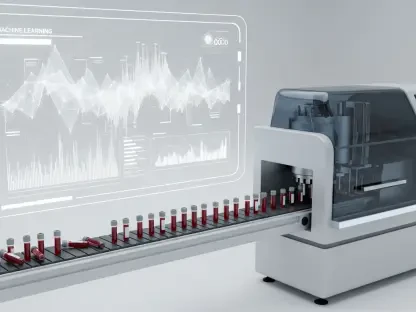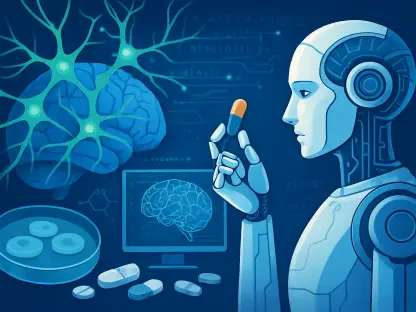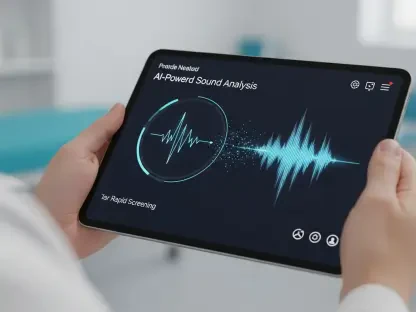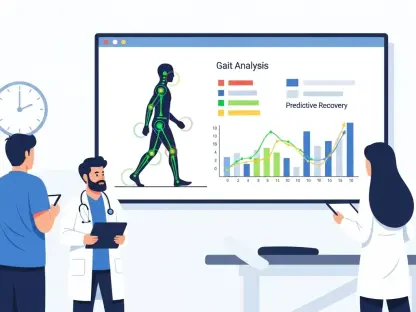The dramatic rise in the global AI in precision medicine market projects an impressive 25-30% surge by 2029. This rapid growth stems from numerous factors: breakthroughs in AI technology, escalating demand for personalized healthcare, the proliferation of genomic data, supportive government policies, and heavy investments in AI for healthcare. These elements collectively aim to transform how diseases are diagnosed, treated, and managed on an individual patient basis.
Technological Advances in AI
Enhanced Data Analysis Capabilities
AI technology advancements are essential to the accelerating growth of the precision medicine market. Enhanced AI technologies significantly boost the ability to analyze complex datasets, including genomic, proteomic, and clinical data. By carefully examining detailed genetic and clinical information, these technologies provide heightened accuracy in diagnosing conditions and predicting treatment outcomes. This granular analysis enables the development of highly personalized treatment plans, tailored specifically to individual patient characteristics.
Machine learning algorithms and deep learning models have seen substantial improvements, allowing them to identify patterns and correlations within these vast datasets more accurately. Such capabilities are instrumental in determining disease risks, refining diagnosis methods, and optimizing treatment plans. The exceptional ability of AI to learn and evolve from vast amounts of data allows healthcare providers to offer more precise, efficient, and personalized patient care. This shift from generalized treatment to precision medicine ensures that patients receive interventions that are specifically tailored to their unique medical needs.
Real-Time Decision-Making
One of the key advantages of AI in precision medicine is its ability to process and interpret data at unprecedented speeds, facilitating real-time decision-making crucial for personalized treatment plans. Real-time data processing ensures that patient care decisions are based on the most current and relevant information available, vastly improving the accuracy and efficacy of treatments provided. This capability is particularly valuable in critical care scenarios where timely interventions can mean the difference between life and death.
Furthermore, advancements in natural language processing (NLP) allow AI systems to extract meaningful insights from unstructured data found in medical records, research papers, and clinical notes. NLP technologies enable the conversion of this vast amount of unstructured information into actionable insights, improving the overall strategic approach to treatment. By recognizing patterns and predictions in this data, AI systems refine and optimize treatment strategies, contributing to better patient outcomes.
Investment Trends
Venture Capital Support
Increased investments from venture capital and other financial sources play a crucial role in fueling the market growth of AI in precision medicine. These investments enable the continuous development and deployment of sophisticated AI technologies designed for precision medicine. The influx of capital supports innovative research, propelling the creation of advanced tools that can manage and analyze complex biological data more effectively.
Investors acknowledge AI’s transformative potential in healthcare, leading to significant investments in startups and established companies focusing on AI-driven solutions. Financial backing also fosters an environment of collaboration among technology companies, pharmaceutical firms, and healthcare providers. These alliances drive the seamless integration of AI into clinical workflows, paving the way for highly accurate and personalized medical care.
Collaboration and Infrastructure
Collaboration encouraged by substantial investments in AI promotes synergy between diverse sectors within the healthcare industry. These collaborative efforts are essential for integrating cutting-edge AI systems into existing healthcare frameworks. By harnessing the expertise and resources of various stakeholders, the precise implementation of AI technologies becomes increasingly feasible, thus advancing precision medicine.
In addition to fostering collaborations, the investment bolsters the development of necessary infrastructure, such as cloud computing and extensive data storage systems. These technological advancements offer robust support for managing the considerable volume of data essential for precision medicine’s success. The efficient handling and processing of large datasets are imperative for generating accurate insights and facilitating real-time decision-making, ultimately contributing to better patient care.
Multi-Omics Integration
Comprehensive Biological Analysis
A notable trend in the AI-driven precision medicine market is the integration of multi-omics data, which combines information from genomics, proteomics, metabolomics, and other omics technologies. This integrative approach allows for a holistic and comprehensive analysis of biological systems, offering a deeper understanding of the complex mechanisms driving health and disease. By nurturing a cross-disciplinary view of diverse layers of data, AI systems can delve into the intricate network of factors influencing patient health.
Utilizing multi-omics data empowers AI to uncover subtle connections and interactions within the vast biological landscape, providing insights that might otherwise be overlooked. This comprehensive analysis facilitates the identification of biomarkers, the understanding of disease mechanisms, and the development of targeted therapeutic strategies. As healthcare moves towards a more personalized approach, incorporating multi-omics data enables a more detailed and accurate characterization of each patient’s unique biological profile.
Advancements in Understanding Disease Complexity
The integration of multi-omics data by leveraging AI technologies has made significant strides in unraveling the complexities of diseases like cancer and rare genetic disorders. This methodology enables the identification of underlying genetic and molecular patterns that contribute to the manifestation and progression of these diseases. Understanding such intricate pathways is crucial for developing personalized treatment strategies that address the specific needs of individual patients.
AI’s ability to process and analyze these diverse datasets allows researchers and clinicians to gain deeper insights into disease etiology, leading to the creation of more effective and targeted therapies. For instance, in oncology, AI-driven multi-omics integration helps in tailoring treatments to the genetic profile of the tumor, improving the chances of successful outcomes. This sophisticated approach not only enhances the precision of treatment plans but also opens new avenues for discovering novel therapeutics and improving overall patient care.
Regional Impact
North America as a Growth Engine
North America is anticipated to remain a major growth driver in the AI in precision medicine market due to its well-established healthcare infrastructure and substantial investments in healthcare information technology. The region’s robust adoption of advanced technologies, coupled with leading technology companies and research institutions at the forefront of AI innovation, spearheads the integration of AI into precision medicine. This forward-thinking approach is facilitated by supportive government policies that further boost research and development efforts.
The prevalence of chronic diseases in North America and the increased demand for personalized treatment plans underscore the necessity for AI-driven precision medicine solutions. Tailored treatment approaches powered by AI can enhance patient outcomes significantly, reducing both the burden of disease and the associated healthcare costs. The alignment of technology, policy, and demand makes North America a vital landscape for the growth and expansion of AI applications in precision medicine.
Contributions in Asia-Pacific
The Asia-Pacific region is also demonstrating significant growth in the AI-driven precision medicine market. This expansion is propelled by major investments in healthcare infrastructure and favorable government policies that promote technological innovation and adoption. The emerging healthcare landscape in this region provides a fertile ground for the implementation of AI solutions, which are seen as essential tools for addressing the increasing burden of disease and enhancing the quality of patient care.
Countries within the Asia-Pacific region are progressively integrating AI into their healthcare systems, fostering collaborations between public and private sectors to maximize the benefits of AI technologies. The focus on developing advanced healthcare infrastructure and investing in AI-driven research initiatives positions the region to be a formidable player in the global precision medicine market. By harnessing the power of AI, the Asia-Pacific region is poised to improve healthcare outcomes and accelerate the adoption of personalized medical practices.
Market Segmentation
Breakdown by Components
The AI in precision medicine market can be segmented into three primary components: hardware, software, and services. The software segment currently holds the largest market share, driven by the widespread adoption of AI-powered platforms designed for diagnostics, treatment planning, and drug discovery. Software solutions play an indispensable role in processing vast amounts of patient data, identifying meaningful patterns, and providing actionable insights that help enhance the precision of medical care.
By enabling the analysis of complex datasets and integrating it with clinical information, software tools facilitate the delivery of highly personalized and efficient healthcare services. The utilization of sophisticated algorithms further aids in predicting disease risks and personalizing treatments based on the patient’s unique genetic makeup and medical history. The growing demand for these advanced, AI-driven software solutions underscores their significance in revolutionizing precision medicine.
Service Segment Growth
In addition to software, the services segment is anticipated to experience the fastest growth owing to the rising demand for AI integration, deployment, and maintenance across healthcare organizations. Services that support the seamless incorporation of AI technologies into existing medical frameworks are becoming increasingly vital. These include consulting, training, system integration, and ongoing technical support, all of which are necessary for the efficient adoption and use of AI-powered tools.
As healthcare organizations embrace AI-driven precision medicine, the need for specialized services to facilitate this transition becomes more prominent. The provision of these services ensures that healthcare providers can leverage AI technologies to their fullest potential, thereby enhancing patient outcomes and streamlining clinical workflows. The growing emphasis on service-oriented solutions further accentuates the dynamic evolution of the AI in precision medicine market.
Therapy Area Developments
Oncology as a Key Focus
Among the various therapy areas, oncology stands out as a primary focus in the AI-driven precision medicine market. This prominence is due to the high global incidence of cancer, the complexity involved in cancer treatment, and the extensive data generated from cancer diagnostics. AI’s capability to analyze, interpret, and utilize large datasets is particularly beneficial in the field of oncology, where precision and accuracy are critical for successful treatment outcomes.
By leveraging AI, oncologists can develop more personalized treatment plans tailored to the unique genetic and molecular characteristics of an individual’s tumor. This approach enhances the effectiveness of therapies, minimizes adverse effects, and improves overall patient survival rates. AI’s impact on oncology underscores its pivotal role in advancing personalized medicine, setting a benchmark for other therapy areas to follow.
Other Significant Therapy Areas
In addition to oncology, AI in precision medicine is making significant strides in other therapy areas such as cardiology, neurology, respiratory diseases, and dermatology. In cardiology, AI-driven solutions enable the early detection and diagnosis of cardiovascular conditions, enhancing the ability to predict patient outcomes and tailor treatments effectively. The integration of AI in cardiology promises to reduce the incidence of heart-related ailments through proactive and personalized interventions.
In neurology, AI technologies aid in diagnosing and managing neurological disorders by analyzing complex neuroimaging data and patient history, facilitating timely and targeted treatment strategies. Similarly, in respiratory diseases, AI-driven precision medicine helps identify patterns in patient data that can predict disease exacerbations, optimizing treatment protocols and improving patient management.
Dermatology also benefits from AI’s precise analytical capabilities, enhancing the diagnosis and treatment of skin conditions through advanced imaging and pattern recognition technologies. These applications across various therapy areas demonstrate the broad impact of AI in advancing precision medicine, emphasizing its role in reshaping the future of healthcare.
Strategic Collaborations
Enhancing Drug Discovery and Diagnostics
Strategic collaborations are pivotal in the AI-driven precision medicine market, with companies engaging in partnerships, acquisitions, and new product launches to gain a competitive edge. For instance, Microsoft and NVIDIA have expanded their collaboration to enhance drug discovery, medical imaging diagnostics, and genomics analysis. By combining Microsoft Azure’s AI capabilities with NVIDIA’s DGX Cloud and Clara suite, this partnership aims to revolutionize the precision medicine landscape through improved data processing and analysis.
These collaborations leverage the strengths of both entities, creating synergies that foster innovation and accelerate the development of AI-driven solutions. The focus on enhancing drug discovery processes and refining diagnostic tools illustrates the vital role of strategic alliances in driving advancements in personalized medicine.
Novel Biotherapeutic Development
Another significant collaboration was between Absci and PrecisionLife, aiming to develop novel biotherapeutics by merging Absci’s AI-driven antibody design with PrecisionLife’s expertise in complex disease biology. This partnership highlights the importance of combining specialized knowledge and cutting-edge technology to create groundbreaking therapeutic interventions. By leveraging AI to design more effective biotherapeutics, this collaboration is set to make notable contributions to precision medicine.
Google’s AI-Powered Solutions
Google Cloud has also significantly impacted the AI in precision medicine market by launching AI-powered solutions aimed at enhancing drug discovery and precision medicine. These innovations are designed to improve the identification of protein structures and genomic data analysis, thereby expediting the development of personalized treatments. Google’s initiatives represent the tech industry’s proactive role in advancing healthcare by leveraging AI to optimize research and clinical workflows.
Predictive Analytics for Disease Management
The global AI in precision medicine market is set to experience a significant surge, with projections indicating an impressive 25-30% growth by 2029. Several factors are driving this rapid expansion. Firstly, advancements in artificial intelligence technology have revolutionized the healthcare industry, making it possible to tailor medical treatments to individual patients more effectively. This personalized approach is becoming increasingly vital due to rising demand for individualized healthcare solutions.
Moreover, the proliferation of genomic data plays a crucial role in this market growth. With more genomic information available, AI can process and analyze this data to provide more accurate and efficient diagnoses and treatment plans. Supportive government policies are also a major contributor, as governments worldwide are recognizing the importance of AI in healthcare and are investing heavily in its development and implementation.
Additionally, substantial investments from both public and private sectors are fueling further advancements in AI for healthcare. These investments aim to enhance the capabilities of AI, ensuring it can manage various diseases more efficiently on an individual patient basis. Collectively, these elements are transforming the landscape of disease diagnosis, treatment, and management, making healthcare more precise and effective for everyone.









